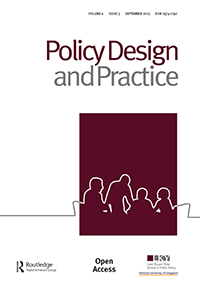Designing effective central-local co-operation: lessons from Liverpool’s Covid-19 response
IF 3.1
Q1 PUBLIC ADMINISTRATION
引用次数: 1
Abstract
Abstract We present empirical evidence from anonymized interviews with local leaders on governance challenges facing health and social care in England. Responding to the Covid-19 pandemic has allowed policy practitioners to see the sector’s problems with new clarity and illustrated potential solutions. We draw conclusions about central government policymaking, regional and local policymaking and some specifics of the pandemic response. Even during the Covid-19 pandemic, we found continuity with governance patterns identified in earlier scholarship. Command and control from the center, although understandably prominent as an emergency response, was not the whole story. Network governance was also visible, for instance in the ability of local organizations to shape the design of national policy on community testing. Central government was also persuaded, reluctantly, to share responsibility with subnational policy makers, for example in contact tracing and the use of individual-level health data, when local authorities demonstrated its usefulness and showed ability and responsibility in its management. The stresses of a crisis will always challenge mutual trust between local and central government, but lessons need to be learned. Central government could explain its actions more effectively, be more transparent about acknowledging uncertainty, and avoid promises which run ahead of the possibilities of delivery. We show how, during the Covid-19 pandemic, central government has neglected the potential contribution of local government even more than previously: we go beyond this to suggest practical steps which local government can take despite central resistance, drawing on sound science, insight into local conditions and community engagement.设计有效的中央-地方合作:利物浦应对新冠肺炎的经验教训
摘要我们提供了来自对地方领导人的匿名采访的经验证据,这些采访涉及英国卫生和社会护理面临的治理挑战。应对新冠肺炎疫情使政策从业者能够以新的清晰度看到该行业的问题,并说明潜在的解决方案。我们得出了关于中央政府政策制定、地区和地方政策制定以及疫情应对的一些细节的结论。即使在新冠肺炎大流行期间,我们也发现了早期学术中确定的治理模式的连续性。来自该中心的指挥和控制,虽然可以理解是一种重要的应急响应,但并不是全部。网络治理也很明显,例如地方组织制定社区测试国家政策的能力。中央政府也不情愿地被说服与国家以下各级的决策者分担责任,例如在接触者追踪和个人健康数据的使用方面,当地方当局证明其有用性并在管理方面表现出能力和责任时。危机的压力总是会挑战地方和中央政府之间的互信,但需要吸取教训。中央政府可以更有效地解释其行动,在承认不确定性方面更加透明,并避免做出超出实现可能性的承诺。我们展示了在新冠肺炎大流行期间,中央政府如何比以往更加忽视地方政府的潜在贡献:我们超越这一点,提出了地方政府可以采取的切实可行的措施,尽管存在中央阻力,并利用健全的科学、对当地条件的了解和社区参与。
本文章由计算机程序翻译,如有差异,请以英文原文为准。
求助全文
约1分钟内获得全文
求助全文
来源期刊

Policy Design and Practice
PUBLIC ADMINISTRATION-
CiteScore
10.30
自引率
4.30%
发文量
19
审稿时长
13 weeks
期刊介绍:
 求助内容:
求助内容: 应助结果提醒方式:
应助结果提醒方式:


